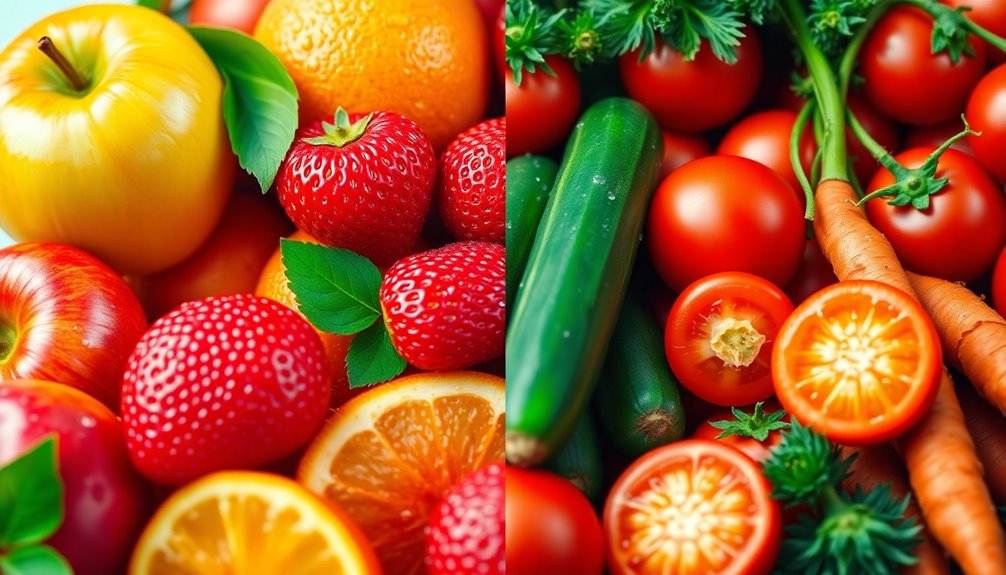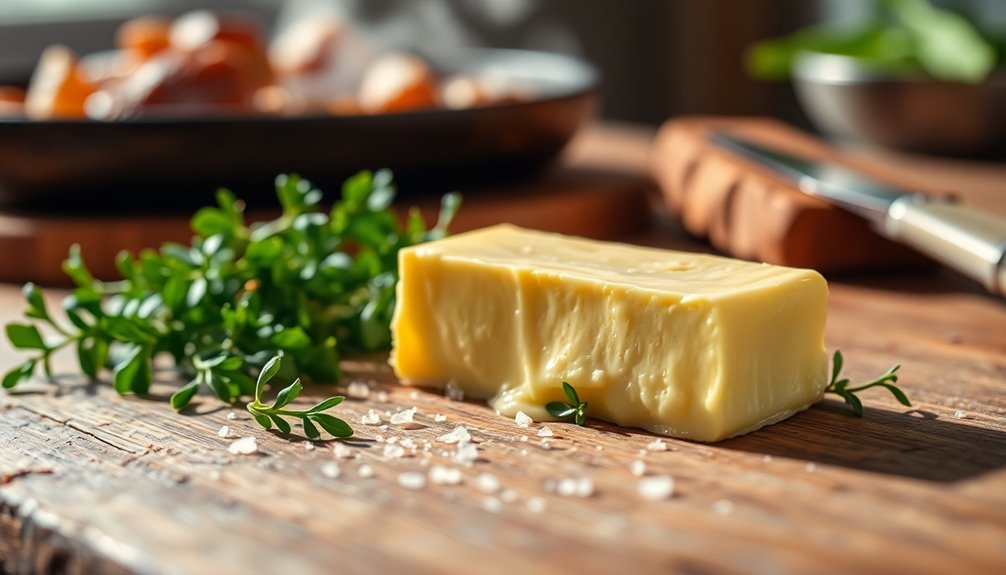Eating healthy fats can transform your body and help you lose fat. These fats, like those found in avocados, nuts, and olive oil, provide essential nutrients and support your metabolism. They shift your body's energy source from carbs to fats, making it easier to shed excess weight. Additionally, healthy fats enhance satiety, so you're less likely to overeat, and they help regulate blood sugar levels, curbing cravings. By choosing the right fats, you reduce the risk of heart disease and improve your overall health. Keep exploring how these fats work their magic for your body transformation!
Key Takeaways
- Incorporating healthy fats like avocados and nuts can promote satiety, reducing overall calorie intake for effective weight loss.
- Consuming omega-3 fatty acids from sources like fatty fish aids in reducing fat mass and improving body composition.
- Healthy fats shift the body's fuel source from carbohydrates to fats, enhancing energy levels and supporting weight management.
- Monounsaturated and polyunsaturated fats improve cholesterol profiles, reducing cardiovascular disease risk while promoting overall health.
- A balanced diet rich in healthy fats, such as the Mediterranean diet, supports sustainable fat loss and improved metabolic function.
Importance of Healthy Fats

Healthy fats are essential for your overall well-being and play a crucial role in various bodily functions. They help absorb fat-soluble vitamins A, D, E, and K, which are vital for maintaining healthy skin, hair, and vision. By facilitating the uptake of these vitamins in your intestines, healthy fats also support immune function and regulate calcium levels, crucial for strong bones.
Moreover, healthy fats provide you with sustained energy, offering 9 kcal per gram—more than carbohydrates and proteins. They help you feel full longer, reducing the urge to snack frequently. By slowing down glucose release into your bloodstream, they help regulate your blood sugar levels, ultimately reducing sugar cravings and supporting weight management. Additionally, excess fats can lead to weight gain if not utilized properly, highlighting the importance of balancing fat intake with physical activity.
In addition to these benefits, healthy fats play a significant role in reducing the risk of cardiovascular disease. They improve cholesterol profiles by decreasing bad LDL cholesterol while maintaining or increasing good HDL cholesterol.
Healthy fats also combat inflammation linked to chronic diseases, support mental health, and help regulate body temperature and cell structure. Embracing healthy fats is a step towards a healthier, more balanced lifestyle.
Types of Healthy Fats

Incorporating various types of healthy fats into your diet can significantly enhance your overall health and support weight loss efforts.
Monounsaturated fats, found in olive, peanut, and canola oils, as well as avocados and nuts like almonds, help maintain good HDL cholesterol while reducing bad LDL cholesterol. These are a great addition to your meals.
Polyunsaturated fats, which include omega-3 and omega-6 fatty acids, are essential for your diet. You can find these in sunflower, corn, and soybean oils, as well as in fatty fish like salmon and walnuts. They also help lower bad LDL cholesterol, making them a smart choice for your heart health. Additionally, diets rich in omega-3 fats are associated with reduced cardiovascular events. Incorporating sources of chia seeds can further enhance your intake of these beneficial fats.
Don't forget about nutrient-rich sources like chia seeds, macadamia nuts, and extra virgin olive oil. Each of these healthy fats provides energy, supports cell function, and aids in nutrient absorption.
While saturated fats can be consumed in moderation, focusing on unsaturated fats helps improve blood cholesterol levels and reduce inflammation.
Metabolism and Weight Loss

Metabolism plays a crucial role in your weight loss journey, as it determines how efficiently your body converts food into energy. By incorporating healthy fats into your diet, you can shift your body's fuel source from carbohydrates to fat, which aids in weight loss. Healthy fats provide 9 calories per gram, making them a significant energy source. They also help absorb essential vitamins that support metabolic health.
Moreover, foods rich in healthy fats, like avocados and nuts, promote satiety, making you feel fuller for longer and helping you reduce daily food intake. In fact, a diet high in polyunsaturated fatty acids can positively affect your hunger and satiety markers within just a week. This means you'll likely consume fewer calories overall, leading to better adherence to weight loss plans. Additionally, studies have shown that a balanced high-fat diet can decrease fat mass while increasing lean muscle mass. Regularly including healthy fats can improve your metabolic health and help maintain weight loss over time. To maximize these benefits, focus on sources like olive oil, nuts, and avocados while keeping saturated fats in check.
Health Benefits of Healthy Fats

Adding healthy fats to your diet can significantly boost your overall health and well-being. These beneficial fats help lower LDL (bad) cholesterol while increasing HDL (good) cholesterol, which reduces your risk of cardiovascular disease. They also decrease triglycerides in the blood and help prevent plaque build-up in your arteries.
Healthy fats aren't just good for your heart; they also play a crucial role in nutrient absorption. They aid in the absorption of fat-soluble vitamins A, D, E, and K, ensuring your body gets the nutrients it needs. Additionally, healthy fats contribute to maintaining optimal cholesterol levels and may even lower overall cardiovascular disease risk.
Plus, they provide energy and support bodily functions, including a healthy nervous system.
When it comes to mental health, healthy fats are equally important. They can help fight bad moods, reduce inflammation, and improve cognitive function, which keeps your mind sharp.
Additionally, they help manage your moods and reduce fatigue.
Lastly, incorporating healthy fats into your meals can enhance satiety, making you feel fuller for longer. This helps curb overeating and encourages healthier eating habits, ultimately leading to a more balanced diet and greater satisfaction after meals.
Impact on Body Composition

Healthy fats play a vital role in shaping your body composition, influencing both fat mass and lean mass. When you consume a balanced high-fat diet, you can experience a reduction in fat mass. Research shows that overweight women saw a significant decrease in fat mass after 16 weeks on such a diet.
Specifically, polyunsaturated fats, particularly Omega-3 fatty acids, are effective at reducing fat mass while promoting lean mass gain. For instance, studies indicate that participants consuming polyunsaturated fats, like those from sunflower oil, gained nearly three times more lean mass compared to those consuming saturated fats. Additionally, incorporating smart toilets can further enhance your hygiene and comfort during your health transformation journey. The positive effects of nighttime meditation can also complement your dietary changes by promoting relaxation and better sleep. Moreover, indexed annuities can provide a level of protection against inflation, similar to how healthy fats protect against fat deposition. Research also suggests that maintaining a high vibrational energy can significantly influence your body's metabolic processes and overall health.
Additionally, incorporating healthy fats can help reduce visceral fat and belly fat, contributing to better overall health. The Mediterranean diet, rich in monounsaturated fats, is particularly effective for this purpose. Additionally, consuming healthy fats can enhance hormone production, which plays a crucial role in maintaining a balanced metabolism.
It's important to note that the type of fat matters; unsaturated fats lead to reduced fat deposition and support positive hormonal changes that promote lean mass gain. By focusing on healthy fats, you're not just transforming your fat mass but enhancing your overall body composition, leading to a healthier, more toned physique.
Practical Dietary Recommendations

When it comes to making dietary choices for weight loss, focusing on healthy fats is essential. Aim to keep your total fat intake under 30% of your daily energy consumption. Prioritize unsaturated fatty acids, replacing saturated and trans fats with healthier options like olive oil, avocados, and nuts. Limit saturated fats to no more than 10% of your intake and keep trans fats to just 1%. Incorporating omega-3 fats can also support overall health and weight management, as found in chia seeds. Additionally, consuming beet juice may enhance blood flow, which is beneficial for overall metabolic health.
Carbohydrates should come primarily from whole grains, vegetables, fruits, and pulses. Strive for at least 400 grams of vegetables and fruits daily, along with 25 grams of dietary fiber. For children, adjust these amounts according to their age groups. New guidelines emphasize that carbohydrate intake should mainly come from whole foods to improve overall health.
Incorporate sources of omega-3 fats like fatty fish, flaxseed, and walnuts into your meals. When cooking or baking, substitute harmful fats with beneficial ones, such as using olive oil instead of butter.
Be cautious with coconut oil, using it in moderation. Lastly, avoid saturated fats from fatty meats and dairy, as well as trans fats from processed foods. This balanced approach will help you maximize the benefits of healthy fats while achieving your weight loss goals.
Tips for Incorporating Healthy Fats

Incorporating healthy fats into your meals can be both enjoyable and simple. Start by adding avocado to your sandwiches, salads, or smoothies for a creamy texture and a boost of nutrients. You can also sprinkle chia seeds into bread, muffins, or homemade granola, or use them to create a delicious pudding, as they are high in fiber, promoting satiety and reducing hunger. Chia seeds are also a great source of protein-packed seeds, making them an excellent choice for a gluten-free diet. Olives make a great addition to pasta, tacos, or even on pizza, and they are also rich in antioxidants, contributing to overall health.
When it comes to snacking, reach for a handful of unsalted nuts and seeds for energy and fiber. Avocado works wonderfully as a snack, too—just slice it or blend it into smoothies. Instead of chips, try olives for a savory crunch.
To enhance your meals, use heart-healthy oils like olive or avocado oil in salad dressings. Healthy fats help lower the risk of heart disease and stroke, making them a crucial part of your diet. Bake fatty fish, such as salmon, with your favorite sauces and pair it with veggies for added nutrition.
Ground flaxseed can be stirred into oatmeal, pancake batter, or yogurt. Lastly, don't forget to add a fried egg on top of Brussels sprouts or other sides for a satisfying touch.
With these tips, you'll easily incorporate healthy fats into your diet!
Frequently Asked Questions
Can I Eat Fats While Following a Low-Carb Diet?
Yes, you can eat fats while following a low-carb diet!
In fact, healthy fats are essential in this type of eating plan. Focus on incorporating sources like avocados, nuts, and olive oil, while also enjoying moderate protein from fish or eggs.
Are There Any Side Effects of Consuming Too Much Fat?
Yes, consuming too much fat can lead to several side effects.
You might experience digestive issues like diarrhea or bloating, as your body struggles to break down excess fat. It can also contribute to weight gain due to the high calorie content of fats.
Moreover, a diet rich in unhealthy fats raises your risk of heart disease, diabetes, and certain cancers.
Balancing your fat intake is crucial for maintaining overall health and well-being.
How Do Healthy Fats Compare to Carbohydrates in Energy Production?
When it comes to energy production, healthy fats and carbohydrates serve different roles.
Fats provide more energy per gram—9 calories compared to carbohydrates' 4. While carbohydrates are your body's preferred source for quick energy, fats offer a slower, sustained release.
When you need immediate energy, carbs are ideal, but in prolonged activities, fats become more efficient.
Balancing both can help optimize your energy levels and overall performance.
Can Healthy Fats Help Improve Skin Health?
Yes, healthy fats can significantly improve your skin health. When you incorporate omega-3 fatty acids into your diet, you help maintain your skin's moisture barrier, keeping it hydrated and preventing dryness.
These fats also possess anti-inflammatory properties, which can calm irritated skin and reduce conditions like acne and eczema. By promoting collagen production, healthy fats contribute to skin elasticity, minimizing fine lines and wrinkles, and ensuring a radiant, youthful complexion.
What Is the Best Time to Consume Healthy Fats During the Day?
The best time to consume healthy fats is in the morning. Starting your day with healthy fats, like nut butters or eggs, gives you sustained energy and keeps cravings at bay.
Avoid high-fat foods at night since they can disrupt digestion and lead to weight gain. Instead, focus on easily digestible snacks.
Ultimately, listen to your body and find what timing works best for you while ensuring a balanced diet throughout the day.
Conclusion
Incorporating healthy fats into your diet can truly transform your body and boost your overall health. By understanding the importance of these fats and how they influence metabolism and body composition, you can make smarter dietary choices. Embrace avocados, nuts, and olive oil, and watch as you not only lose fat but also improve your well-being. Remember, it's about balance and making the right choices—so enjoy those healthy fats and reap the benefits!










